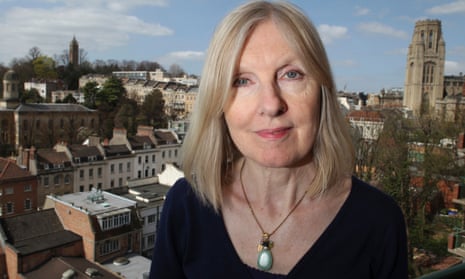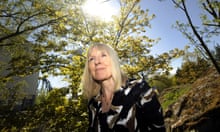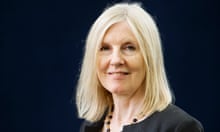The writer Helen Dunmore, who has died aged 64 of cancer, seldom made herself her subject. The author of 12 novels, three books of short stories, numerous books for young adults and children and 11 collections of poetry, she was remarkable in that, although she made an impression from the start, her career evolved in unexpected ways.
As she grew older, she knew what to shed, how to travel light, how to pursue questions that occupied her single-mindedly – as if sweeping a room clear of dust. In her 20s, she had written a couple of unpublished autobiographical novels and would imply that these belonged in the bottom drawer – mere staging posts on the road to becoming a novelist, a way of getting herself out of the picture.
In an age of self-involvement, Dunmore never wrote a memoir. In an age of intrusive interviews, she kept journalists at a kindly distance. She lived in Cliftonwood, Bristol – the setting for her superb and poignant last novel, Birdcage Walk (2017). She knew she was dying only at the editing stage but suggested, in an afterword, that she must have known subliminally because the novel was “full of a sharper light, rather as a landscape becomes brilliantly distinct in the last sunlight before a storm”. The story is of an 18th-century property developer and his wife, and set at the time of the French revolution, but in Bristol. Dunmore’s workplace was a flat on Bristol’s northern slopes from which, eight floors up, she could see the city below: “I find the view beautiful and absorbing,” she wrote in 2016 in a rare first-person piece for the Guardian, “but not a distraction.”
She was – first and last – a poet. Her first collection, The Apple Fall, was published when she was 30, her last, Inside the Wave, in April this year. It was her 1988 collection, The Raw Garden, that established her, celebrating nature without flattery. She had an eye for the imperfection that makes beauty interesting (she read Wild Strawberries, a poem from this collection, beautifully on Radio 3’s The Verb in February this year). In 2007, her poem The Malarkey, submitted anonymously, won the National Poetry Competition. It was, she said, about “what time takes away and how we take time for granted”. Her last collection is her most spare and moving. Inside the Wave is smooth as a sea pebble and liminal – poised between life and death.
It would have been natural to predict, given Dunmore’s talent, that a poet is what she would exclusively remain. But she started submitting stories to magazines – collected as Love of Fat Men (1997) – and once said that, in prose, she was “taking the brakes off”. In 1993, aged 40, she published Zennor in Darkness, a debut novel that won the McKitterick prize and was described by John le Carré as “beautiful but inspiring”. What emerged was a gift for making history human. This bold novel placed literary figures (DH Lawrence and his German wife, Frieda, thought to be spies by Cornish locals) alongside invented characters without strain. It read authoritatively – almost as if penned by Lawrence – but it was Dunmore’s understanding of what it must have been like to lose sons and lovers in the first world war that made it memorable.
In The Siege (2001), shortlisted for the Orange prize and the Whitbread, she went further. She described the siege of Leningrad, focusing on the frailty of a city and the resilience of its citizens facing and, in some cases, outfacing extremity. This was followed by The Betrayal (2010, longlisted for the Booker) about postwar Russia. In The Greatcoat (2012), a ghost story for Hammer, she focused on the aftermath of the second world war and in The Lie (2014), it was the first world war’s aftermath that detained her.
It takes imaginative courage (as well as research) to envisage the ways in which historical events wreck lives. As a novelist, courage was Dunmore’s defining quality – part of her emotional intelligence. She was famous for her generosity to other writers. She taught on Arvon Foundation courses, set up a Bristol poetry group, worked on the management committee of the Society of Authors and was, for a year, its chair. She was a trustee of the Royal Literary Fund.
Other subjects and settings – aside from war – recurred in her work. Cornwall often featured. Dunmore had, for 40 years, a family house in St Ives and loved the county. The sea (often seen from Porthmeor beach) captivated her – her conversation with it, in prose and poetry, ending only with her death. Her ability to write sensually about food was much praised. Winter was her season (A Spell of Winter won the Orange prize in 1996, its inaugural year), although her winter’s tales were thawed by her warmth as a writer. She was a qualified teacher and time spent teaching in Finland (1973-75) used to be offered as the explanation of how she became a connoisseur of the cold.
Dunmore was born in Beverley, Yorkshire, the second of four children of Betty (nee Smith) and Maurice Dunmore. She grew up in a haphazard, bookish household. Her father managed industrial firms but loved poetry and Dunmore learned many rhymes, hymns and ballads during a peripatetic childhood. She attended Nottingham high school, then studied English at York University (1970-73) where she became entranced by the Russian poets, especially Osip Mandelstam (she was a lifelong Russianist). Her critical work included studies of Emily Brontë’s poetry, DH Lawrence’s stories and Virginia Woolf’s relationships with women. She became a fellow of the Royal Society of Literature in 1997.
She had a rapport with children, as her unpatronising books for younger readers show. Her Ingo series was magical: she made mermaids and mermen seem more real, less provisional, than humans. Dunmore’s readers will not be surprised to learn she loved gardening – she knew her wild flowers. She was a plucky swimmer, venturing into the sea on cold days in a wetsuit. She loved art, buying as much as she could afford and enjoying collaborations with artists and musicians.
But, however adept at living well, she was undeceived about life’s difficulties. She once said the “safe” life was the exception. And she was sensitive to the subject of mortality. In her marvellous novel Mourning Ruby (2003), grief was an impostor against whom there was no defence. Each chapter began with an elegiac quotation borrowed from another writer. The epilogue opened with a poem of her own:
A field is enough to spend a life in.
Harrow, granite and mattress springs,
shards and bones, turquoise droppings
from pigeons that gorge on nightshade berries,
a charm of goldfinch, a flight of linnets,
fieldfare and January redwing
venturing westward in the dusk,
all are folded in the dark of the field,
all are folded into the dark of the field
and need more days
to paint them than life gives.
She married Frank Charnley, a lawyer, in 1980. He survives her, along with her son, Patrick, daughter, Tess, stepson, Ollie, and grandchildren, Hugo, Amber and Blake.
Helen Dunmore, poet and novelist, born 12 December 1952; died 5 June 2017
- This article was amended on 10 June 2017. Helen Dunmore’s novel Betrayal was about postwar Russia rather than spying. The novel she wrote about spying, not mentioned in this piece, was Exposure (2016). The title of A Spell of Winter has been corrected. It was further amended on 13 June 2017. The Apple Fall was published when Dunmore was 30, rather than 22.







Comments (…)
Sign in or create your Guardian account to join the discussion